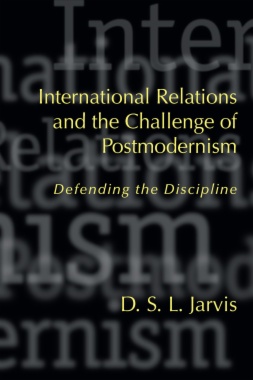Assesses current poststructural and postmodern theories and defends international relations as a discipline
Promising to stimulate discussion among both those who celebrate the arrival of the "Third Debate" and those who fear its colonialization and spread, D. S. L. Jarvis offers an innovative appraisal of the various postmodern and poststructural theories sweeping the discipline of international relations. Citing the work of Richard Ashley, Jarvis explores the lineage of postmodern theory, its importation into international relations, and its transformation from critical epistemology to subversive and deconstructive political program.
Inspired by a deep-seated concern that theory in international relations is becoming increasingly abstract and unrelated to the subject matter scholars strive to understand, Jarvis argues that much postmodern and poststructuraltheory has impoverished our theoretical understanding of global political relations, embroilling us in incommensurate discourses and research agendas driven by identity politics.
By developing a series of critical typologies to assess postmodern and poststructural theories, Jarvis mount a ringing defense of the discipline's exisiting research methods and epistemologies, and he suggests that more harm than good has come of the epistemological subversion occasioned by the Third Debate.
- Cover�������������������������������
- International Relations and the Challenge of Postmodernism����������������������������������������������������������������������������������������������������������������������������������������������������������������������������������������������
- Title�������������������������������
- Copyright�������������������������������������������
- Dedication����������������������������������������������
- Contents����������������������������������������
- Preface�������������������������������������
- Chapter One Theory and Metatheory in International Relations: The Third Debate and the Challenge of Postmodernism�������������������������������������������������������������������������������������������������������������������������������������������������������������������������������������������������������������������������������������������������������������������������������������������������������������������������������������������������������������������
- Chapter Two Contemplating the Crisis in the Crisis of Contemplation: Identity, Perception, and Derision in International Relations����������������������������������������������������������������������������������������������������������������������������������������������������������������������������������������������������������������������������������������������������������������������������������������������������������������������������������������������������������������������������������������������������������������������
- Chapter Three Sentinels of Dissidence: A Typology of Postmodern Theory����������������������������������������������������������������������������������������������������������������������������������������������������������������������������������������������������������������������������������
- Chapter Four Richard K. Ashley and the Subversion of International Political Theory: The “Heroic” Phase�������������������������������������������������������������������������������������������������������������������������������������������������������������������������������������������������������������������������������������������������������������������������������������������������������������������������������������
- Chapter Five Continental Drift: Ashley and Subversive Postmodernism�������������������������������������������������������������������������������������������������������������������������������������������������������������������������������������������������������������������������
- Chapter Six Feminist Revisions of International Relations: Identity Politics, Postmodern(isms), and Gender����������������������������������������������������������������������������������������������������������������������������������������������������������������������������������������������������������������������������������������������������������������������������������������������������������������������������������������������
- Chapter Seven In Defense of Theory: Reaffirming Reason, Rearticulating Relevance����������������������������������������������������������������������������������������������������������������������������������������������������������������������������������������������������������������������������������������������������������������
- Notes�������������������������������
- Bibliography����������������������������������������������������
- Index�������������������������������
- About the Author����������������������������������������������������������������

